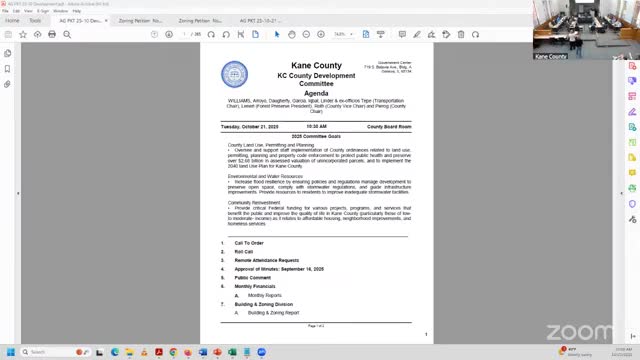Kane County committee hears neighbors’ safety, noise and animal concerns as short-term rental licensing draft reviewed
Get AI-powered insights, summaries, and transcripts
Subscribe
Summary
Neighbors described parties, parking and safety problems tied to a short-term rental; county staff presented a draft licensing ordinance and members asked for more specifics, enforcement detail and legal review before any vote.
Suzanne Blasnick, a Kane County resident, told the Development Committee that a short-term rental on her small, dead-end street has caused “disruptions such as loud parties, overflowing parking in the street and lawn,” and other disturbances that she said make the neighborhood less desirable.
Deanna Davidson, who said she lives next door to the rental, told the committee the house routinely sees “15, 20, 25 people in and out of the neighborhood at any given time,” and argued the cul-de-sac design of the street raises “a major safety issue” because it provides only one way in and one way out when many vehicles and unfamiliar visitors are present.
Mark Van Kirkoff, director of development and community services, told the committee staff worked with the county attorney’s office to draft a short-term rental licensing ordinance. He said the draft would amend the county code to add a licensing program administered by his department and to add short-term rental violations to the county’s administrative-adjudication process so fines and other penalties could be imposed for violations.
John Mall, Kane County code enforcement officer, said the licensing approach would give enforcement staff contact information for owners and an administrative tool — including potential suspension or revocation of a license — to address repeat problems that are difficult to resolve today because owners often do not respond to mailed notices.
Committee members raised multiple areas that need work before any ordinance would be brought back for action. Commissioner Iqbal said the draft is not in final form and listed issues he wants added or clarified, including limits tied to cul-de-sacs or local street type, animal restrictions, a maximum occupancy mechanism, and minimum-stay limits. Commissioner Lindner asked for limits on party size and hours, noting the difference between overnight occupants and transient gatherings where many people visit for a few hours. Commissioner Allen said vacationers “behave differently” than neighbors and emphasized protecting residential character. Several members urged the committee to seek more detailed enforcement language tied to the sheriff’s office, including whether decibel-based noise limits could be used and how to ensure deputies could enforce them.
Several committee members and staff said the state’s attorney’s office had already reviewed parts of the draft. Van Kirkoff and others asked members to submit specific suggested changes by email within two weeks so the county attorneys could review legal defensibility before the next meeting. The committee did not take any vote; members agreed to continue the discussion at a future meeting after additional work with the state’s attorney and sheriff’s office.
The public comment and committee discussion incorporated several concrete requests for the draft ordinance that staff said they will consider: clear limits on occupancy and event size, animal restrictions, minimum-stay lengths, designation of where short-term rentals are allowed (for example excluding cul-de-sacs), a defined enforcement authority (the director of development or another designee), and potential decibel-based noise standards to assist sheriff enforcement. Van Kirkoff said administrative adjudication and licensing would give the county leverage to notify listing platforms and pursue suspension or revocation of a license if necessary.
The committee asked staff to circulate a revised draft and to invite deputy county attorneys to the next meeting for legal advice. No ordinance was adopted at this meeting.
